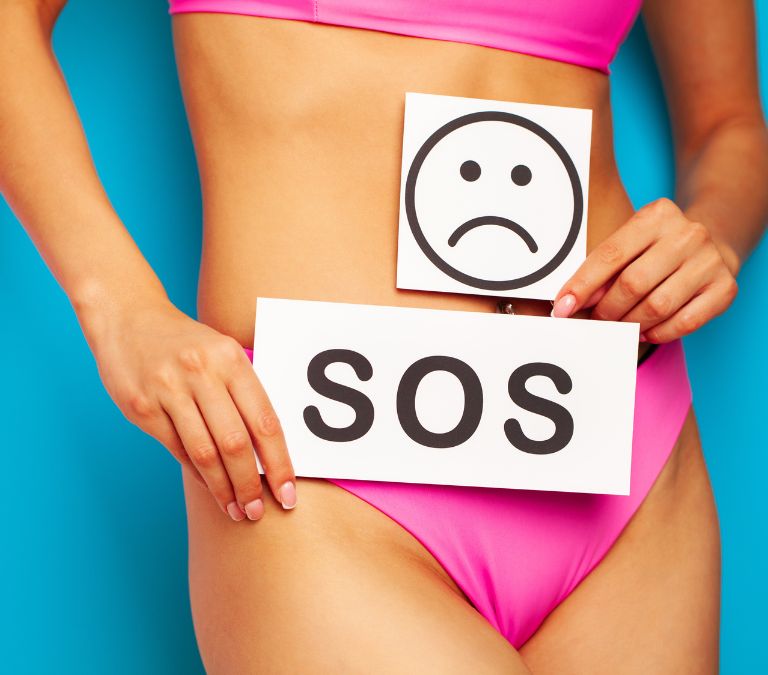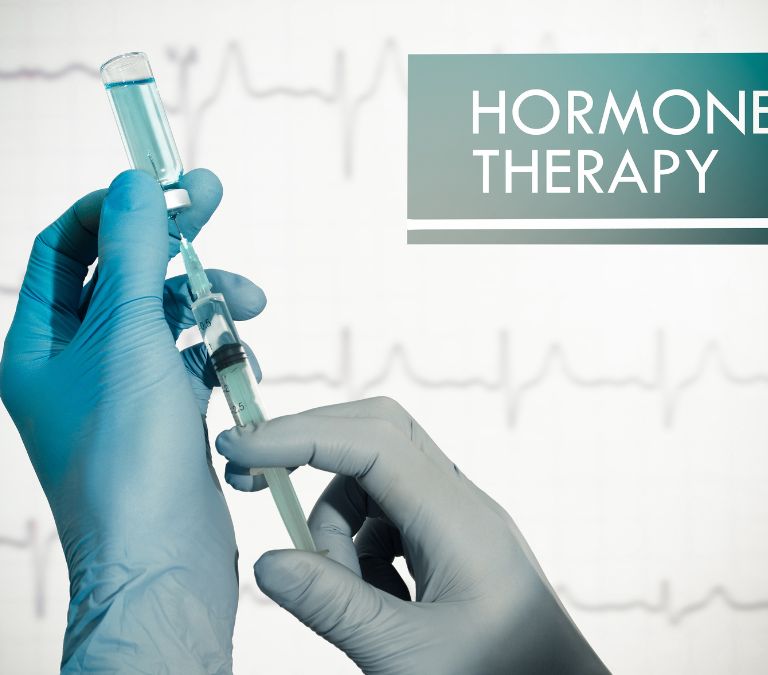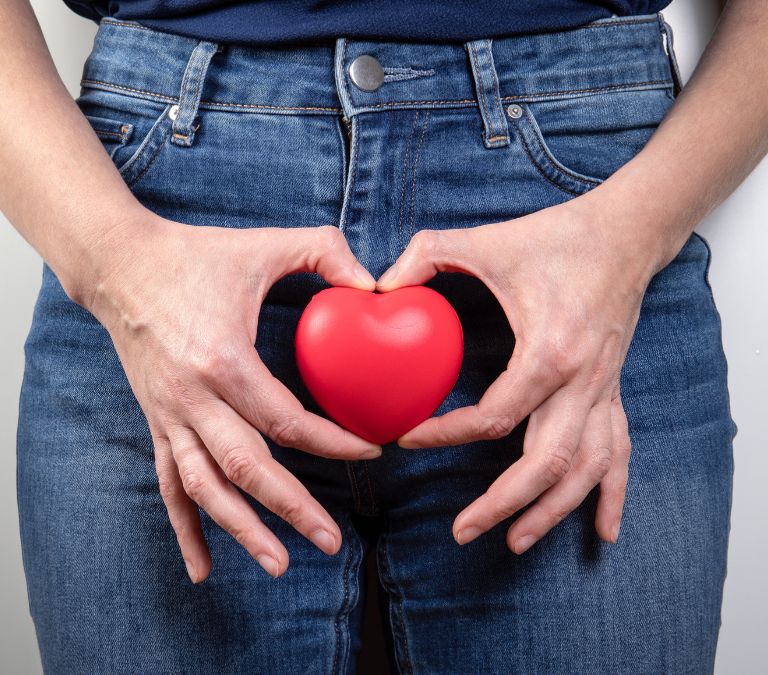Menopause comes with various symptoms that can sometimes be severe. During menopause, ovarian failure leads to a decline in hormonal levels, the leading cause of most menopausal symptoms. After 12 consecutive months of no periods, a woman is confirmed to have gotten to menopause, and at this point, natural pregnancy is impossible.
Some common menopausal symptoms include hot flashes, night sweats, sleep disruption, vaginal dryness, vaginal itching, irritability, brain fog, low libido, and bloating. Menopause also causes increased risks of complications like cardiovascular diseases, weight gain, osteoporosis, memory loss, and certain cancers.
While hot flashes and night sweats are the most common menopausal symptoms, studies have shown that vaginal itching and menopause go simultaneously in many women.
How Menopause Causes Vaginal Itching

In women, the sex hormones are predominantly produced by the ovaries. As you go further in age, the functionality of the ovaries slowly declines and eventually ceases. As the ovaries decline, sex hormones like estrogen and progesterone also decline, and problems like irregular menstruation and vasomotor symptoms become imminent. Hormone fluctuations often cause vaginal itching during menopause. As estrogen levels drop, the walls and tissues of the vagina become dry, leading to vaginal dryness and itching.
Hormone fluctuations during menopause can also lead to changes in the pH levels of the vagina which can disrupt the balance between good and bad bacteria. With this, the vagina becomes prone to infections which could cause itching. The thinning and drying of the vaginal tissues give room for complications related to the vagina, like dryness, itching, burning, and irritation.
Also known as vaginal atrophy, the thinning of the vaginal tissues can make intercourse painful and discomforting. It is one of the major reasons for the decline in sexual desires among menopausal women. Besides hormone fluctuations, vaginal itching can also be caused by inflammation, cancers in the vagina region, and irritation from chemicals in soaps, detergents, and underwear.
Also known as vaginal pruritus, genital itching, in most cases, appear together with vaginal dryness. Studies have shown that most menopausal women who complain of genital itching also experience vaginal dryness of varying severity. Vaginal itching is more common than you think.
Menopausal symptoms often peak in perimenopause and decline in postmenopause. Although, many women in postmenopause still go on to experience severe menopausal symptoms.
Other Causes of Vaginal Itching
In most cases, vaginal itching experienced by women in their mid-ages is caused by menopause. However, several factors are also linked as likely causes of vaginal itching, even during menopause. Some other causes of vaginal itching include:
Infections
Studies have found that certain infections can tamper with the vagina and the vulva to a point where itching becomes irresistible. Some common infections include chlamydia, genital warts, bacterial vaginosis, and yeast infections.
Irritants
Besides menopause, the most common cause of vaginal itching in women in their mid-ages is irritant contact dermatitis. This irritant can result from frequent washing, scratching, harsh soap and other chemicals, persistent contact with urine, and rubbing. Due to the effects of irritants on sexual health, women, especially menopausal women, are advised to steer clear of
Vulva Cancer
Although rare, vaginal itching may be caused by vulva cancer. Vulva cancer affects the external part of the genitalia and may cause persistent itching, burning, and bleeding of the vulva. Vulva cancer may also cause pain in the pelvic region, as well as painful intercourse and painful urination.
Skin Conditions
Certain skin conditions like folliculitis, lichen simplex, atopic dermatitis, lichen planus, and allergic contact dermatitis can cause itchiness of the skin, extending to the vulva and vagina or both.
Symptoms of Vaginal Itching
While itching is the characteristic feature of vaginal pruritus, you can experience other conditions related to the genitals. Some common symptoms or accompanying conditions of vaginal pruritus include vaginal burning, vaginal dryness, discomfort during intercourse, burning with urination, genital itching, vaginal discharge, bleeding after intercourse, and low sexual drive.
While vaginal itching may sound like a small problem, it has made the period of menopause extra rough for many women worldwide. In some menopausal women, vaginal itching occurs with low severity, while it could be excruciating in other women. Studies have shown that many menopausal women suffering from vaginal itching do not seek effective treatments. Many women see it as normal, and to find instant relief, they end up taking substances that could even make it worse.
When to See a Doctor
Generally, the period of menopause is too delicate to be handled alone. During menopause, the average woman becomes vulnerable to many diseases, and the foods she eats or the activities they indulge in could either make it better or do otherwise. For this reason, talking to a doctor is extra important.
When it comes to vaginal itching, many women are embarrassed to talk to a doctor. With this, they shy away from medications and embrace unproven options to find lasting solutions. Regardless, menopausal women who experience changes in their genitals are advised to see a doctor immediately. Changes that could warrant an appointment with a doctor include any forms of spots, burning, soreness, bleeding, or weird discharge.
While hormonal changes can influence vaginal itching and dryness, many cases are caused by chemicals in soaps, deodorants, and clothes. With a doctor’s appointment, you can access the most effective treatment and management options not just for vaginal itching but also for other menopausal symptoms affecting you.
Remedy for Vaginal Itching during Menopause
Just like many other menopausal symptoms, you can effectively treat vaginal dryness. Here are the best treatment options for vaginal itching during menopause:
Medical Remedies
Medications are often described as the best options for treating menopausal symptoms. Today, innovations in the medical industry have provided significant solutions to menopausal women and their symptoms. Medical remedies for vaginal itching include:
Estring Ring
This medication is important solely for treating problems with the vagina during menopause. The Estring ring is inserted directly into the vagina and helps provide estrogen to the vaginal tissues. To get optimal results and avoid severe risks and side effects, hormones administered for treating menopausal vaginal problems are to be inserted directly into the vagina and not swallowed or injected.
Estring rings can help with problems like vaginal dryness, vaginal itching, burning, painful intercourse, and painful urination. By using this medication, several women have reported a significant reduction in the severity of vaginal itching. Using the string ring is easy and is often explained on the package of the product. However, you can still meet with a doctor for clarity purposes.
Estrogen Cream
Estrogen cream contains a mixture of estrogen hormones and can be used to treat vaginal problems triggered by fluctuating hormonal levels. Estrogen cream can effectively treat problems like vaginal itching, vaginal dryness, and burning caused by low estrogen levels. With a doctor’s prescription, estrogen creams can be gotten and used.
A doctor’s prescription for estrogen cream is important because this medication has been linked to numerous side effects and is the cause of various allergies.
Hormone Therapy

Hormone therapy is regarded as the most effective treatment option for menopausal symptoms. Many menopausal women have reported significant improvements in their menopausal symptoms after undergoing hormone therapy. Hormone therapy aims to balance the hormones by providing the body with hormones needed for optimal health. For example, menopausal women with low estrogen levels can be injected with estrogen hormones made in the lab. This way, a balance in hormonal levels is attained, and the symptoms caused by low estrogen are effectively managed.
Hormone therapy is used to manage menopausal symptoms more effectively. Menopausal women, who experience vaginal itching and low concern symptoms, aren’t advised to take HRT. However, studies have shown that menopausal women who take hormone therapy for their menopausal symptoms are most likely to experience fewer or less severe cases of vaginal itching. Hormone therapy isn’t the best option if you only experience problems with the vagina and no other severe menopausal symptoms.
Many women have sought alternatives to solving their menopausal problems due to the risks associated with hormone therapy. Studies have shown that long-term hormone therapy could increase your risk of conditions like cardiovascular diseases and certain cancers. An appointment with a doctor is important before opting for hormone therapy.
Phytoestrogens
Phytoestrogens are hormone-like compounds found in plants. While phytoestrogens are quite different from the naturally occurring estrogen in the body, studies have shown that they can perform similar functions as the natural estrogen in the body. The use of phytoestrogen for relieving menopausal symptoms has risen over time due to reports of reduced risks and similar benefits compared to hormone therapy. However, doctors will usually recommend other options before the use of phytoestrogens.
Home Remedies
Certain procedures are taken to manage genital itching effectively. Many simple steps have been made available to help menopausal women deal with the painful and discomforting problems of vaginal itching. With the many risks involved in hormone therapy and other medication, many women have resorted to adopting home remedies as a treatment option for vaginal itching. Home remedies are considered safer when compared to medical remedies and are also more accessible. Here are some steps you can take to help maintain good vaginal health.
Baking Soda
Studies have shown that adding some baking soda to your bath water can go a long way in relieving itching. The National Eczema Association has suggested that adding a quarter cup of baking soda into your bath water or applying a cream or lotion on the skin’s surface surrounding the vulva can relieve itching.
According to the Australian Menopause Society, adding half a teaspoon of baking soda to 1 liter of water can be used to wash the vulva and relieve itching. However, this option is only temporary, and medications are still advised to get lasting solutions.
Bath Oil
Even during menopause, dry skin can majorly cause vaginal itching. Studies have shown that adding gentle oils to your bathwater can help moisturize the skin and relieve vaginal itching. While doing this, it is important to avoid bath oils with fragrance as they could cause further complications and irritate the vulva more.
Yogurt and Honey
In the genitalia, lactobacilli, a good bacteria, helps in the production of lactic acid, an important substance known for regulating the pH of the vagina and preventing the growth and development of certain pathogens. Good bacteria can also be found in your yogurt. Studies have suggested that applying a mixture of yogurt and honey to the external part of the vagina can help prevent or treat vaginal itching by repelling fungal infections. However, studies on the effectiveness of yogurt and honey in treating vaginal itching remain unlimited.
Garlic
While the use of garlic as a remedy for vaginal itching remains widely disputed, a study has shown that the use of garlic may be effective in alleviating certain vaginal infections. It has been suggested that taking garlic capsules or inserting garlic into the vagina can help treat or prevent certain infections. However, this theory remains controversial, and women are advised to talk to an expert before adopting this home remedy.
Oatmeal
Studies have shown that the consumption of oatmeal could reduce the intensity of vaginal itching. As an anti-inflammatory, oatmeal can help reduce dryness and itchiness in the skin and the vagina. To use oatmeal, it is recommended to add half a cup of it to your bath water and leave for about 15 minutes. By doing this, you can be assured of reduced itching, as well as prevention of eczema, dry skin, and contact dermatitis.
Lifestyle Options
Lifestyle changes are very important to maintain optimal health during menopause. Menopause comes with complications that, in most cases, must be adapted to live a normal life. For example, menopausal women experiencing waves of hot flashes can help themselves by wearing loose-fitting clothes and sleeping in a cool environment. This way, the problem of hot flashes is effectively managed. Some common lifestyle changes for vaginal itching include:
Staying Hydrated
There are a lot of benefits attached to drinking water. Drinking more water can help maintain healthy skin and boost the immune system. Dehydration leads to dry skin, dizziness, weakness, headaches, confusion, rapid heartbeat, rapid breathing, and vaginal dryness. In most cases, vaginal dryness influences vaginal itching, and dehydration can facilitate the dryness of the vagina.
Menopausal women are advised to drink as much water as possible, preferably 8 to 12 glasses daily. Besides helping relieve vaginal dryness and itching, staying hydrated helps develop and maintain optimal health, which may contribute to a smooth transition into postmenopause.
Eating a Healthy Diet
There isn’t much research on the effects of food on vaginal itching. However, studies have shown that menopausal women who adopt healthy food options are less likely to show severe menopausal symptoms. Menopausal women are advised to eat more greens and vegetables and dairy and poultry products. Studies have shown that high consumption of sugary and spicy foods and high intake of caffeinated and tobacco products can aggravate symptoms and further make the menopausal journey more tiring.
Exercises and Other Physical Activities
Generally, menopausal women are advised to engage in more exercise. Exercises help improve general metabolic function, prevent weight gain, improve heart health, and prevent certain cardiovascular diseases. Also known for helping menopausal women deal with depression and anxiety, exercises are very important for developing and maintaining optimal health. However, some women have reported increased severity of itching after exercising. While this is true, it is important to know that increased itching after exercise is only temporary and will stay for a very short time. Exercises are not considered an effective option for alleviating vigil itching. Exercise and engage in other physical activities to ensure a smooth transition into menopause.
Prevention of Vaginal Itching
While menopause increases your risk of vaginal itching, many menopausal women live happy lives without any problems with the genitalia. When menopause is effectively managed and with the right steps, vaginal itching is prevented. Generally, menopausal women are advised to eat nutrient-rich foods and adopt healthy lifestyles to go through a smooth transition into menopause. However, many women today follow every instruction from the doctor regarding effective menopause management, and they still suffer from vaginal itching. Specifically for vaginal itching, menopausal women can take the following steps to prevent itching and other conditions of the vagina:
- Wearing loose-fitting clothing
- Using soap free of fragrance and corrosive chemicals
- Wearing cotton underwear
- Using physical barriers like internal and external condoms during intercourse to help prevent STIs
- Using water-soluble lubricant during intercourse
- Wiping from front to back
A doctor’s appointment will be important for menopausal women experiencing several menopausal symptoms, including vaginal itching. In some cases, treatment and management options for menopause can help relieve vaginal itching.
FAQs for Menopausal Vaginal Itching
Can vaginal itching be cured without treatment?
Sometimes, vaginal itching can go without any form of treatment. In menopausal women, hormone fluctuation is the major cause of several symptoms. When the hormones are not balanced, the severity of symptoms increases, and when the hormones become balanced, things seem to go back to normal. This mechanism can also apply to vaginal itching. Sometimes, vaginal itching can go on its own when hormone levels approach a balance. However, it is important to take treatment and management options to help with it, as prolonged exposure to menopausal symptoms has been proven to reduce the quality of life of several women.
What is the best cream for vaginal itching?
In many cases, the doctor does the diagnosis and recommends a specific treatment option. However, hydrocortisone cream has been used by many menopausal women to help them alleviate vaginal itching, and significant results have been reported.
Can vaginal itching be stopped right away?
Medical treatment is the most effective and lasting option for treating vulva /vaginal itching. However, certain home remedies can be effective in temporarily stopping vaginal itching right away. Using colloidal oatmeal, baking soda, and bath oils can stop vaginal itching immediately but temporarily. While home remedies reduce the severity of itching, medications can treat the underlying cause of the problem and provide lasting solutions.
What are the dangers of scratching?
Vaginal itching comes with excruciating discomfort that many women are often tempted to scratch when it happens. As satisfying as scratching may feel, it could aggravate the problem and lead to even more complications like soreness. Medications and home remedies are the best options for dealing with vaginal itching.
Can Exercises Increase Vaginal Itching?
In some cases, yes. Many women have reported increased itching after exercising or other physical activities. However, it usually lasts for a short time. Exercises during menopause reduce your risk of many severe symptoms, and doctors highly recommend it.
Can I engage in intercourse while dealing with vaginal itching?
Most times, vaginal itching goes hand-in-hand with vaginal dryness. Itching and dryness of the vagina can mess up sexual health by reducing libido. However, menopausal women with vaginal itching aren’t advised to engage in intercourse without a protective barrier like a condom. In the cases of vaginal itching caused by vaginal dryness, lubrication of the vagina is important to prevent soreness of the vagina tissues.
Conclusion
Menopause is a compulsory phase of every woman’s life that can sometimes be difficult to handle. There are more women in menopause today, and the need for lasting solutions to menopausal problems has never been this amplified. From hot flashes to night sweats, vaginal dryness to vaginal itching, many menopausal symptoms are very discomforting, and many women today have taken the wrong actions to reduce the severity.
Many women suffer from vaginal itching, but with the help of a doctor and proven control measures, they have effectively managed and treated it. For this reason, an appointment with a doctor is important before opting for any management option. Menopause is a delicate phase, and your actions during this phase could either make it better or worsen it. Menopause doesn’t change who you are, but you can change the effects of menopause on you.







